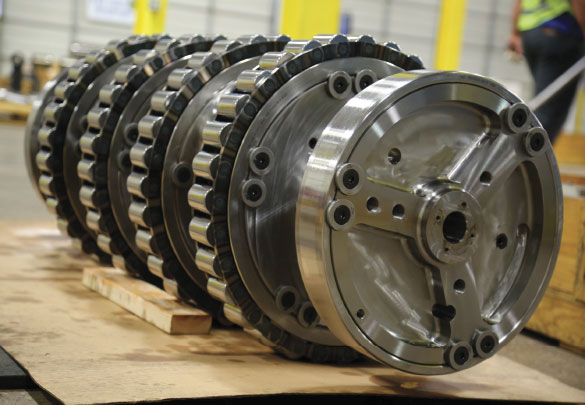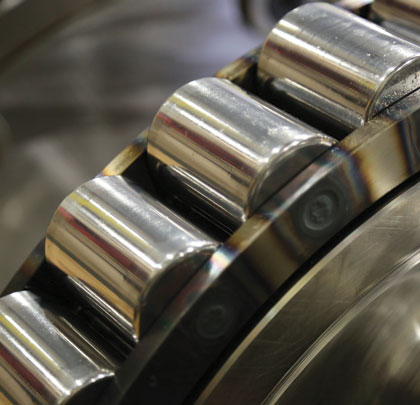A close-up showing roller bearings on the QEM 3000 following 2,700 hours of demanding service.
The world of frac pumps has changed dramatically. Harsh environments, longer horizontals, and economic realities are driving intermittent-duty pumps beyond the limits of their capabilities. Historically, pumps simply have not been designed to run at full rod load under such relentless operations.
Faced with highly demanding operations, operators expect to repair and replace their frac pumps regularly due to the wear and tear caused by pumping in extreme conditions. They are also often required to keep backup pumps on site, in case of failures.
Weir Oil & Gas understood the challenges. The result? A pump that lasts significantly longer in even the most challenging conditions along with enhanced productivity and reduced total cost of ownership by at least 17 percent.
A NEW LOOK FOR A NEW DAY
Re-engineered from the ground up, the SPM® QEM 3000 Frac Pump, part of the company’s performance line of pumps, gives customers the ability to run at a sustained 275,000-pound rod load and is built tough enough to meet even the most relentless, demanding operator requirements, including continuous duty.
The pump features a number of industry firsts, including a dual-line lubrication system, multi-stage onboard filtration, and enhanced structural rigidity. It also offers the market’s largest roller bearings and other oversized components to more efficiently distribute load stress across a greater surface area. These enhancements were designed to address the most common causes of pump failure.
REPORTING FOR DUTY, NORTH OF THE BORDER
The pump has been a grand slam for one of Weir’s Calgary, Alberta-based customers with a QEM 3000 operating at a site in Western Canada.
In the Duvernay and Montney formations, the SPM® QEM 3000 pump operated sixteen to eighteen hours per day in temperatures averaging 20 to 23 degrees Fahrenheit (-6.6 to -5 degrees Celsius) at a frac pressure of 10,500 to 13,000 psi, average rod load of 206,250 to 233,750 psi with a five-inch plunger and a flow rate of 264 gallons per minute to 343 gallons per minute.
Roller bearings looked new at the 3,200-hour inspection and shell bearings were barely broken in. Other wear parts that would normally require replacement, such as guide sleeves, showed insignificant wear and did not require replacement. Moreover, Weir’s industry-first onboard filtration system delivered clean oil to enhance bearing life through optimized control.

The crank assembly for the QEM 3000 after 2,700 hours of service looks nearly new. For customers with harsh operating conditions, the QEM 3000 pump offers the durability they need to meet even the most relentless operations.
CREATING A BUZZ
The SPM® QEM 3000 continues to yield unsurpassed results and savings in the field as it looks and performs like new after 3,200 hours of field-proven use in extreme conditions in the winter months in the Duvernay and Montney Shale Play. Whatever conditions an operator is running legacy pumps in today, the SPM® QEM 3000 can run in similar conditions. The SPM® QEM 3000 is expected to extend maintenance cycles by a factor of three as compared to what operators are achieving in similar service conditions today. These enhancements dramatically affect their bottom lines.
Results such as those are creating a buzz and enhancing the experience of leading well-service companies. Weir’s Canadian-based customer has realized huge savings by reducing non-productive time and eliminating expensive parts replacement, inventories, support equipment, and pump rebuilds.
While the traditional frac pump development process typically tests up to one million cycles, Weir completed an endurance test of its beta SPM® QEM 3000 in its Fort Worth Research and Development Center lasting three times longer than other pumps in the company’s history.
BUILDING PROGRESS AND PARTNERSHIPS
Collaborating with the industry is one of the most rewarding aspects of what Weir does. Perhaps more rewarding is seeing the efficiencies and the impacts to the bottom line that are experienced by customers. Whether it is at a trade show, conference room, or out in the field on a frac site, Weir seeks to engage with customers to find solutions that make them more productive.
ABOUT THE AUTHOR:
Bryan Wagner is director of engineering and product management, pressure pumping, for Weir Oil & Gas. Weir provides a comprehensive range of products and services which support drilling, well completion, production, and downstream operations around the world. More customers choose Weir frac pumps than any other. Our pressure control products and services ensure operations run safely and efficiently; all supported by the industry’s leading service center network. For more information, visit www.global.weir.
_______________________________________________________
MODERN PUMPING TODAY, July 2018
Did you enjoy this article?
Subscribe to the FREE Digital Edition of Modern Pumping Today Magazine!
![]()


